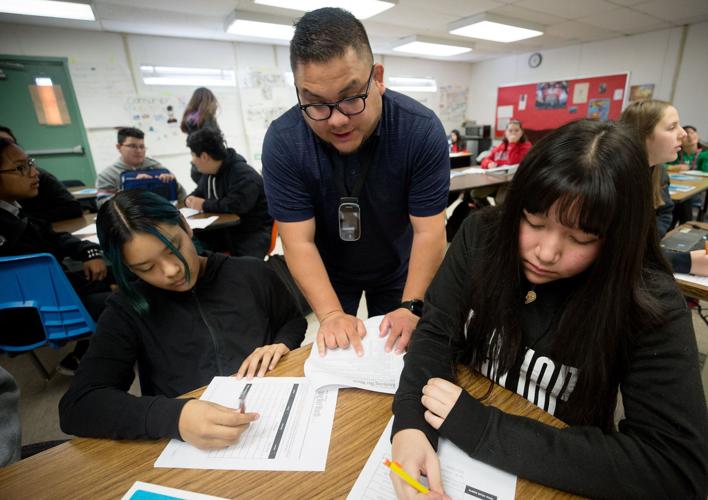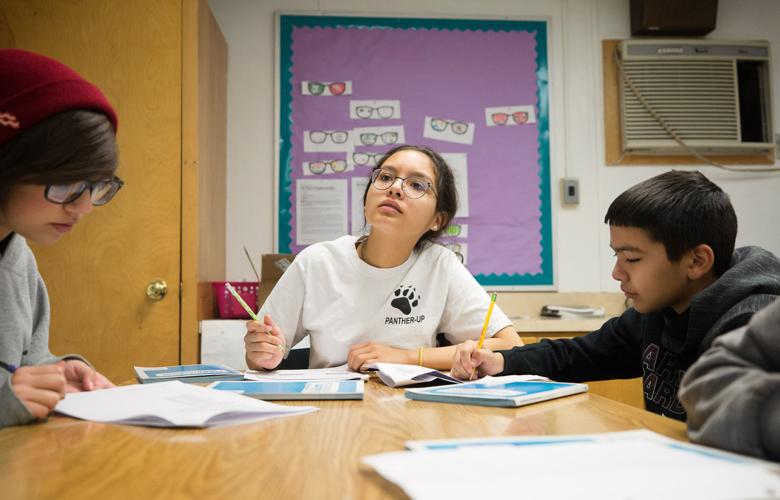Would you rather have $1 million right now or a penny that doubles every day for a month? This was the question that John Garza asked his 29 students before diving into a lesson on the merits of investing.
Hand-drawn posters titled “The United States of Consumer Education” and “From Poor to Rich” lined the walls of Garza’s Tucson classroom as he discussed bonds, liquid assets and deductibles.
“Who has heard of mutual funds?” he asked the class. A few hands tentatively went up. “Who knows what it means?” The hands shot back down. The course was consumer science. The students were 12 to 14 years old.
Last August, Pistor Middle School became one of Tucson’s first middle schools to offer a course on financial literacy.
At a school where over 80% of students qualify for free or reduced lunch — an indicator of poverty, there may be no such thing as “too early” to prepare for the future, according to Pistor’s principal, Elizabeth Rivera-Russell.
“The goal is for all of our students to have a better life than we did,” she said.
That’s where Garza comes in.
In designing the yearlong elective from scratch, Garza said he created content to meet the needs of the modern student.
Class projects include calculating the salary for their dream career, researching median incomes and property values in various areas, and estimating the cost of their future bills.
The students are introduced to concepts like inflation, compound interest and liquid assets. They also learn how to invest and avoid debt.
For some parents, the course sparks hope.
“If we can get these kids to start thinking about their future economic status, we really can break the cycle of poverty,” said Jennifer Lee, the mother of an eighth-grader in the course, Sierra Titus.
Lee said the course helped Sierra buckle down on choosing a high school and has made her more aware of the cost of living.
For Christmas last December, Sierra asked for a debit card. She wanted to start saving.
Pistor’s consumer elective came on the heels of SB 1184, a bill signed into law by Arizona Gov. Doug Ducey in April 2019 requiring financial literacy for high school graduation.
The new law was part of an effort by State Treasurer Kimberly Yee, who said financial literacy is a priority for her administration.
“If we don’t teach students early on, they become adults that can’t manage their money,” Yee said, calling Pistor’s move to offer the class “wonderful.”
The course isn’t just serving students. Seeing the program roll out from its conception is also fulfilling for Garza.
“If I could envision a perfect job, this is it,” he said, though just four years ago he never could have imagined it.
Garza came to Pistor with an emergency teacher certification, teaching physical education for three years.
In early 2019, Garza’s certification was set to expire, but Rivera-Russell didn’t want to lose him, saying he’d become a role model for many of the kids.
Rivera-Russell had identified a deficit in Pistor’s elective offerings. When she discovered Garza’s degree was in aviation business, the idea clicked. Together, the two created the consumer course.
Though Garza said he was scared at first and had no formal training, he had a wealth of experience to drawn on.
“I was one of these kids,” he said, having grown up nearby.
“I’ve dealt with everything not to do.”
After creating all of his own lesson plans, Garza was able to petition the TUSD Governing Board for course materials, and now the elective is near capacity.
So what’s the answer to the million-dollar question Garza posed to his students?
One penny, doubled every day, will become $5.3 million by the end of a 30-day month.






